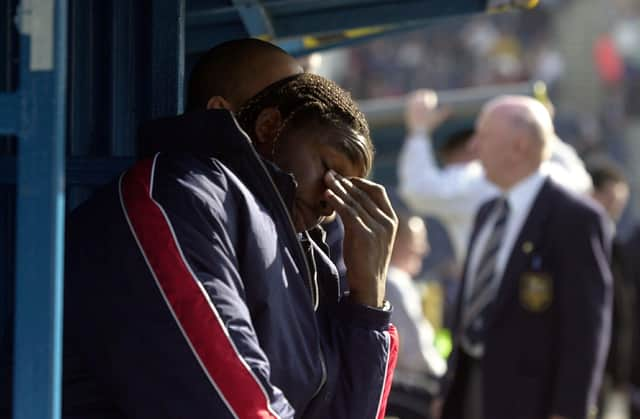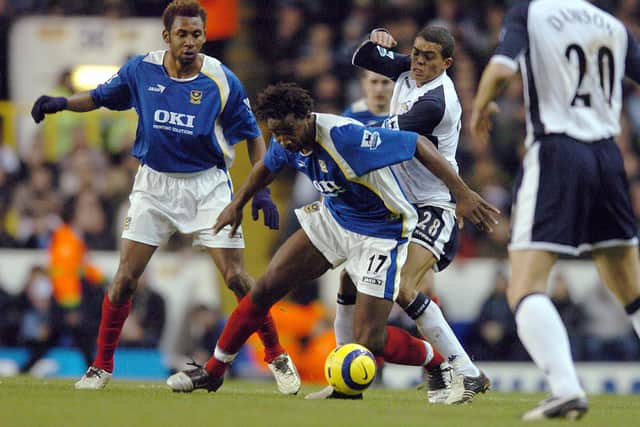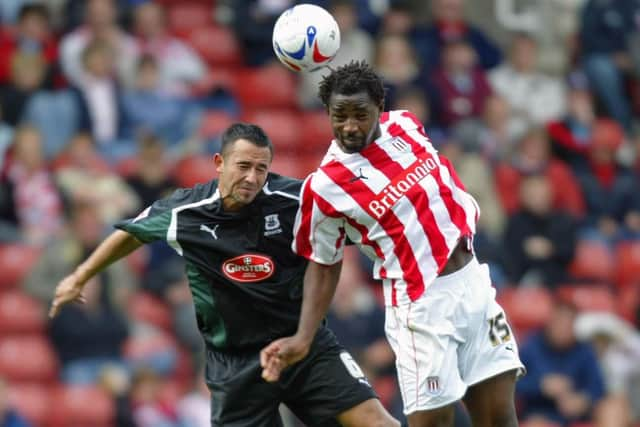A career unfulfilled - Ex-Juventus, Portsmouth and Stoke striker Vincent Pericard on prison, depression, injury and suicidal thoughts


‘I was caught speeding while driving to training. I already had nine points and faced a ban, so lied and claimed my step-father was at the wheel,’ the 37-year-old told The News.
‘The police investigated, trying to get in touch with my family in France to check the story, without success.
Advertisement
Hide AdAdvertisement
Hide Ad‘Then my step-father, being a Christian, woke up one morning and decided he could no longer bear lying to God, so called the police.
‘He admitted he hadn’t been in England for more than 15 years. I was sentenced to four months in prison.’
As a 19-year-old, Pericard’s Juventus team-mates consisted of such international luminaries as Zinedine Zidane, Edgar Davids, Gianluigi Buffon, Lilian Thuram, Pavel Nedved, David Trezeguet and Alessandro Del Piero.
A decade later, burdened by no longer able to do himself justice in non-league surrounds and suffering from mental health issues, the striker announced his retirement.
Advertisement
Hide AdAdvertisement
Hide AdDespite the former France under-21 international twice winning promotion from the Championship and featuring at Premier League level, his was a career unfulfilled.


He added: ‘When I retired from football I went through a major reflection on how I went from playing alongside Zidane to 10 years later having to retire – the main factor was my mental health.
‘Had I received the help I needed, my career would probably have been different, I could have made other decisions, learnt how to handle criticism instead of taking it personally and shutting down. I had depression, but didn’t realise.
‘It didn’t begin like that. I had my career vision set on Italy and progressing into Juventus’ first-team. I appeared in the Champions League – then things changed.
Advertisement
Hide AdAdvertisement
Hide Ad‘There were three of us, all from France, given an Italian tutor by the club. I texted her one weekend asking what she was up to and whether she fancied going for a drink with us.


‘It was an amicable request, no agenda, very polite. She had been good to us, we saw her once a week to learn Italian, so it’s good to be friends outside our normal environment.
‘Little did I know that she was the mistress of a married Juventus director. When she received the text, they were together in the bedroom or whatever. Listen, don’t mess with Italian men’s women!
‘We hurt his pride – and the three of us were immediately sent out on loan. I went to Pompey. None of us played for Juventus again.
Advertisement
Hide AdAdvertisement
Hide Ad‘My career changed over that stupid thing. When you think about it, a single error can literally change the direction of your life.


‘Following my season-long loan at Pompey, I told Juventus I didn’t want to return to Italy because I had fallen in love with English football. So I stayed at Fratton Park.’
The initial June 2002 loan arrival of Pericard undoubtedly represented a coup for Pompey boss Harry Redknapp.
Aged 19, the striker had served two seasons with the Italian giants having been recruited from Saint-Etienne by future World Cup-winning manager Marcello Lippi.
Advertisement
Hide AdAdvertisement
Hide AdPericard’s sole first-team outing was as a 61st-minute substitute against Arsenal during a March 2002 Champions League encounter.
Then circumstances dictated he must fulfil a season-long loan with Pompey, a challenge he set upon with impression conviction, netting 10 times in 35 appearances as they claimed the Division One title.
However, a torn quad muscle forced him off in the campaign’s penultimate game against Rotherham, sparking a succession of injuries to his left leg for the rest of his playing days.
Having sealed a permanent Fratton Park move in the summer of 2003, he would be restricted to 14 Blues appearances over the next three seasons.
Advertisement
Hide AdAdvertisement
Hide AdPericard said: ‘My mental health issues began the second time I got injured at Pompey, which was a cruciate ligament during my reserve-team comeback in September 2004.
‘I knew I had so much talent and potential, yet every time I tried to come back and do my best, something would happen to prevent me, such as an injury or freak accident. Mentally, I entered a very dark place.
‘I was Tony Pulis’ first Stoke signing, where we won promotion to the Premier League in my second season, yet I soon discovered the other side of English football.
‘It was more brutal, relying on the physical attributes of each player, not so much about passing but kicking the ball forward, flipping it or running the channels. It killed my love for football. Being polite, it didn’t suit me.
Advertisement
Hide AdAdvertisement
Hide Ad‘Fans were getting back on my back, nobody likes reading criticism of themselves in the paper, and one day I told the manager I could no longer play in front of these people crucifying me. I asked for a break.
‘Professionally, that broke the relationship and I wasn’t trusted again. I became a bench player.
‘We are not taught how to deal with with depression, instead you use negative coping mechanisms such as drinking, gambling and womanising to hide frustration.
‘I played a lot of online poker, it was stupid, while I trusted the wrong people. I’d go out at stupid o’clock drinking until very, very late, it was a bad lifestyle.
Advertisement
Hide AdAdvertisement
Hide Ad‘I didn’t know what depression was, I thought I was just having a bad time. It was only upon retiring that I realised. I should have called for help a lot sooner, but there was no-one to guide me.
‘There is not one player who has an incident-free career, but it impacts on everyone in different ways. I guarantee you injury is usually the trigger, taking someone from being happy into dark days.
‘It can impact upon your relationship with your partner, children, parents and friends. My partner at that time wasn’t aware what was going through, she just saw my negative behaviour. I was distant, going out all the time, not seeing things from her perspective, basically being a bad partner and eventually we separated.
‘At one point I looked at a bottle of sleeping pills in my room and thought about suicide. It ran through my mind that perhaps if I took six or seven I may wake in the morning. If not, then never mind, no-one would notice.
Advertisement
Hide AdAdvertisement
Hide Ad‘Depression is a fact of life. It doesn’t matter if I’m a footballer, that’s just life – and it’s important you talk.’
In August 2007, Pericard was sentenced to four months in prison for perverting the course of justice after claiming his step-father drove his speeding Mercedes, clocked at 103mph outside Plymouth.
By then a Stoke player, he was sent to HM Prison Exeter, a category B, where he shared a cell with an arsonist.
Pericard said: ‘One evening, I heard noise coming from the cell next door – the following morning I was told the occupant had hung himself. It brutalised the situation I was in.
Advertisement
Hide AdAdvertisement
Hide Ad‘Still, I made sure I went to the gym every day, staying positive, determined to come out of prison stronger. I was released after three weeks with a tag attached to my left ankle.
‘I was a different man during my first few training sessions back at Stoke, strong, confident, it was amazing. Then my tag broke.
‘That was fine, I quickly went to my Manchester home, gave them a call, and somebody arrived to fix it. I warned them it could happen again, considering my job. They told me it was fine.
‘A few days later it broke again, so I repeated the routine, back at home for around 2pm and called them. I was told somebody would be on their way – nobody arrived.
Advertisement
Hide AdAdvertisement
Hide Ad‘At 6am the following day, two policemen knocked at my door: “Mr Pericard, we’re taking you back to prison. Last night you broke your curfew by not registering you were home”.
‘I had never left the house, I was there waiting for someone to fix it. As it was broken, of course it couldn’t register that I was in.
‘I was taken to Strangeways prison for two weeks, the level of injustice shattered me mentally, I gave up. It broke me, I was destroyed.
‘I didn’t do any training, didn’t do any running. When I came out that second time, I wasn't the same person, there was no motivation, I had a disconnection with everything.
Advertisement
Hide AdAdvertisement
Hide Ad‘At the age of 29, I retired while with Havant & Waterlooville. Physically I couldn’t do it anymore, I didn't recognise myself.
‘I asked myself why I was playing. My injury meant I’d never get back to the Premier League or Championship. I was dragging out the inevitable.’
Just 274 supporters were present at Staines Town to witness the end of Pericard’s playing days in November 2011.
Although there was a cameo for Wessex League side Moneyfields three-and-a-half years later.
Advertisement
Hide AdAdvertisement
Hide AdPericard racked up 183 games and 32 goals during duty with Pompey, Sheffield United, Plymouth, Stoke, Southampton, Millwall, Carlisle and Swindon, yet has since embarked on an alternative career path.
Having set up Elite Welfare Management to assist foreign players settling into their new climate, he then forged a partnership with the University of Portsmouth to adopt his WhatsUp concept.
The app provides rapid access to the university’s wellbeing and mental health services. In March, the coronavirus crisis influenced WhatsUp usage up 130 per cent.
Pericard graduated with a first-class degree in Business Enterprise Development in July 2017, followed by a masters in Accounting and Finance.
Advertisement
Hide AdAdvertisement
Hide AdPresently on a two-year BT graduate scheme, he is scheduled to qualify in September, earning the role of BT customer success hub manager for Europe, representing a remarkable renaissance.
‘Maybe football was a bad thing required to achieve a positive? I feel so much happier now,’ said Pericard.
‘I was at Juventus, then, following promotion to the Premier League with Pompey, I could see myself at Chelsea, Manchester United, wherever. I had the talent, but through circumstances out of my control didn’t get there.
‘There are some regrets, but the chance for career progression at a massive company like BT is amazing. I speak three languages and can work anywhere in the world.
‘I’ve come out of a tunnel, the dark times are behind me.’
Advertisement
Hide AdAdvertisement
Hide AdA message from the Editor
Thank you for reading this story on portsmouth.co.uk. While I have your attention, I also have an important request to make of you.
With the coronavirus lockdown having a major impact on many of our advertisers - and consequently the revenue we receive - we are more reliant than ever on you taking out a digital subscription.
Subscribe to portsmouth.co.uk and enjoy unlimited access to local news and information online and on our app. With a digital subscription, you can read more than 5 articles, see fewer ads, enjoy faster load times, and get access to exclusive newsletters and content. Visit our Subscription page now to sign up.
Advertisement
Hide AdAdvertisement
Hide AdOur journalism costs money and we rely on advertising, print and digital revenues to help to support them. By supporting us, we are able to support you in providing trusted, fact-checked content for this website.
Comment Guidelines
National World encourages reader discussion on our stories. User feedback, insights and back-and-forth exchanges add a rich layer of context to reporting. Please review our Community Guidelines before commenting.
